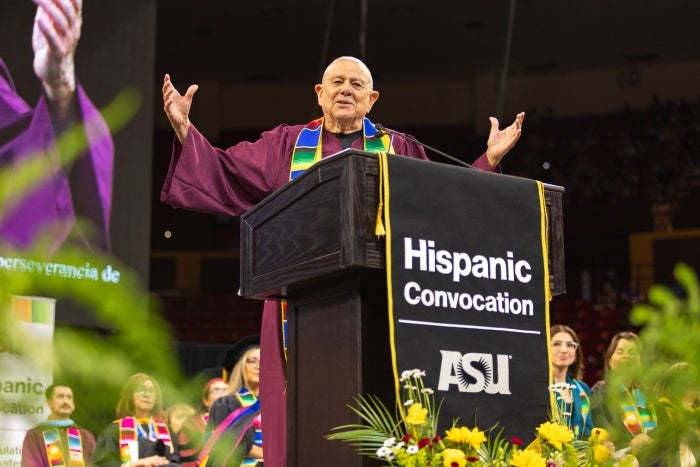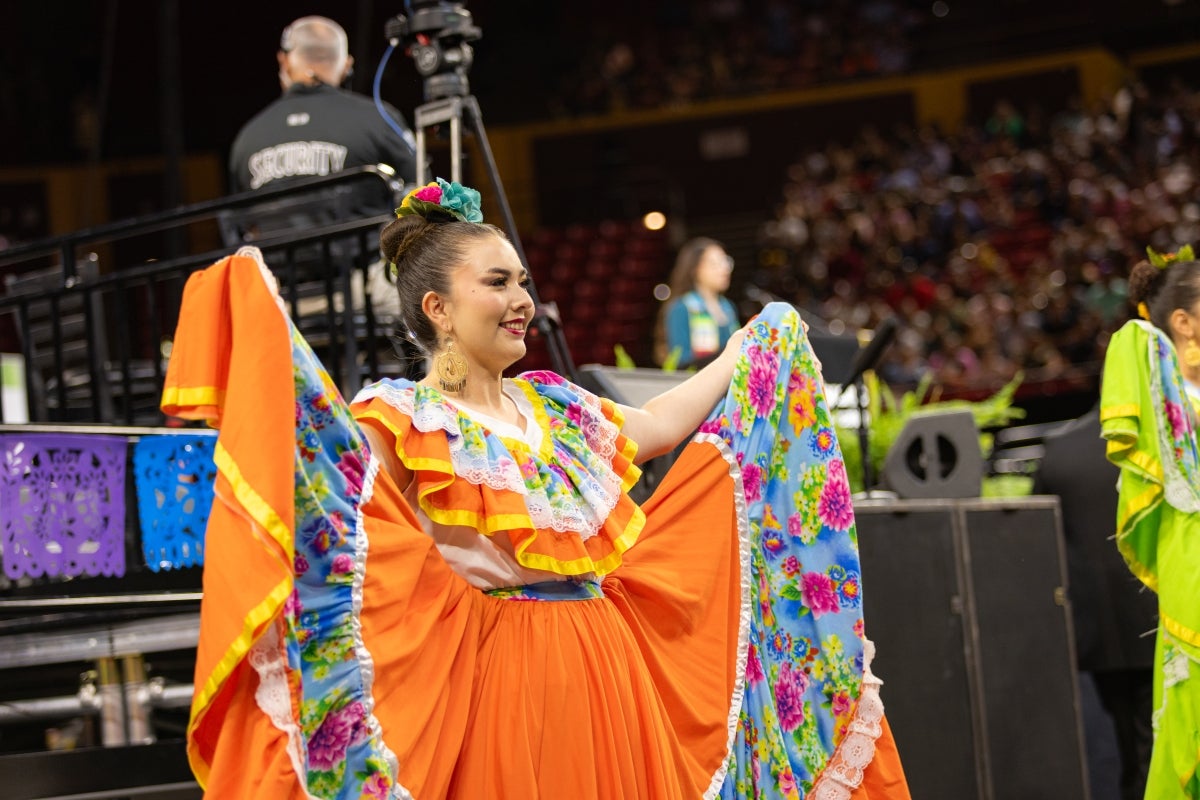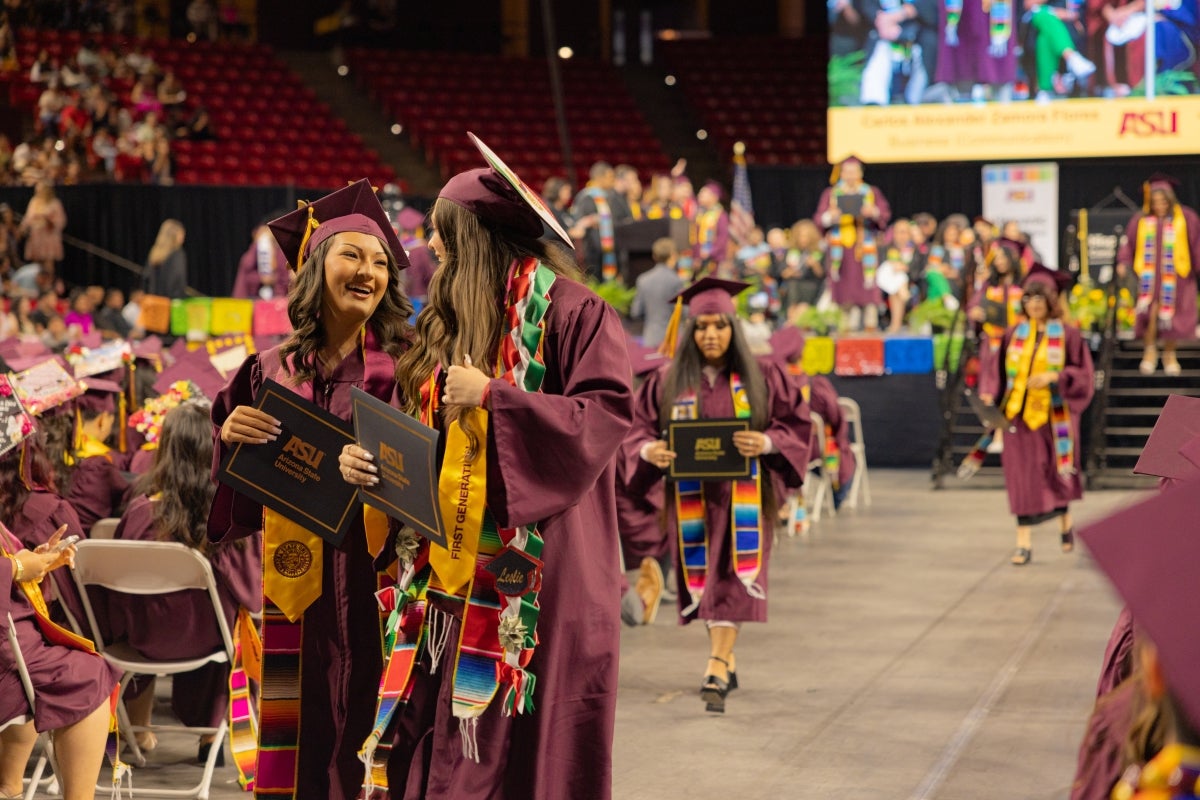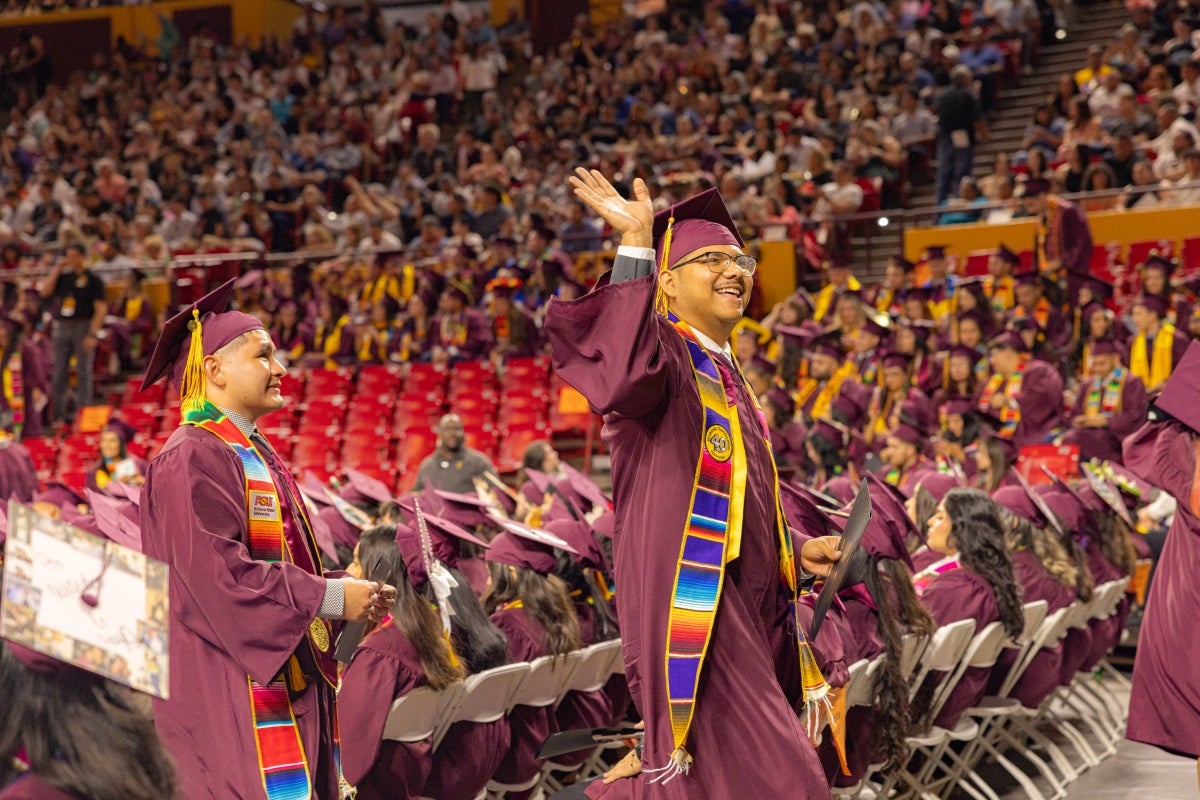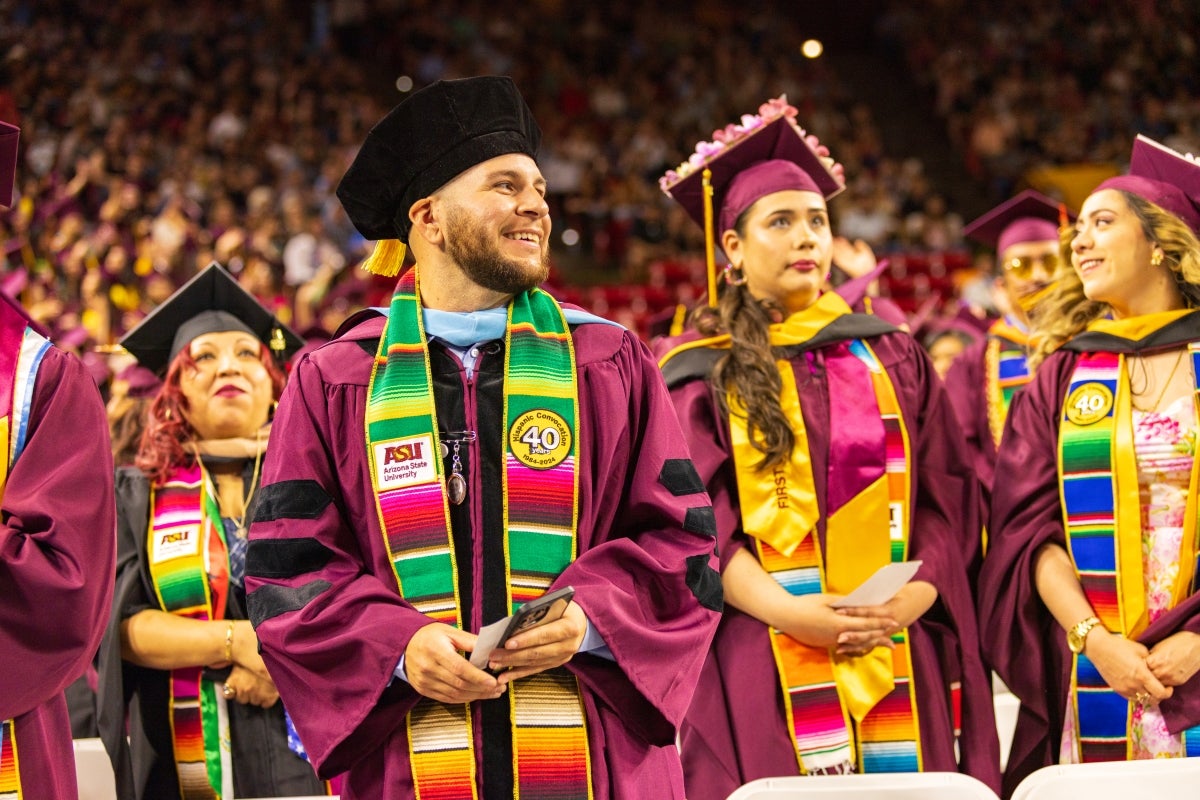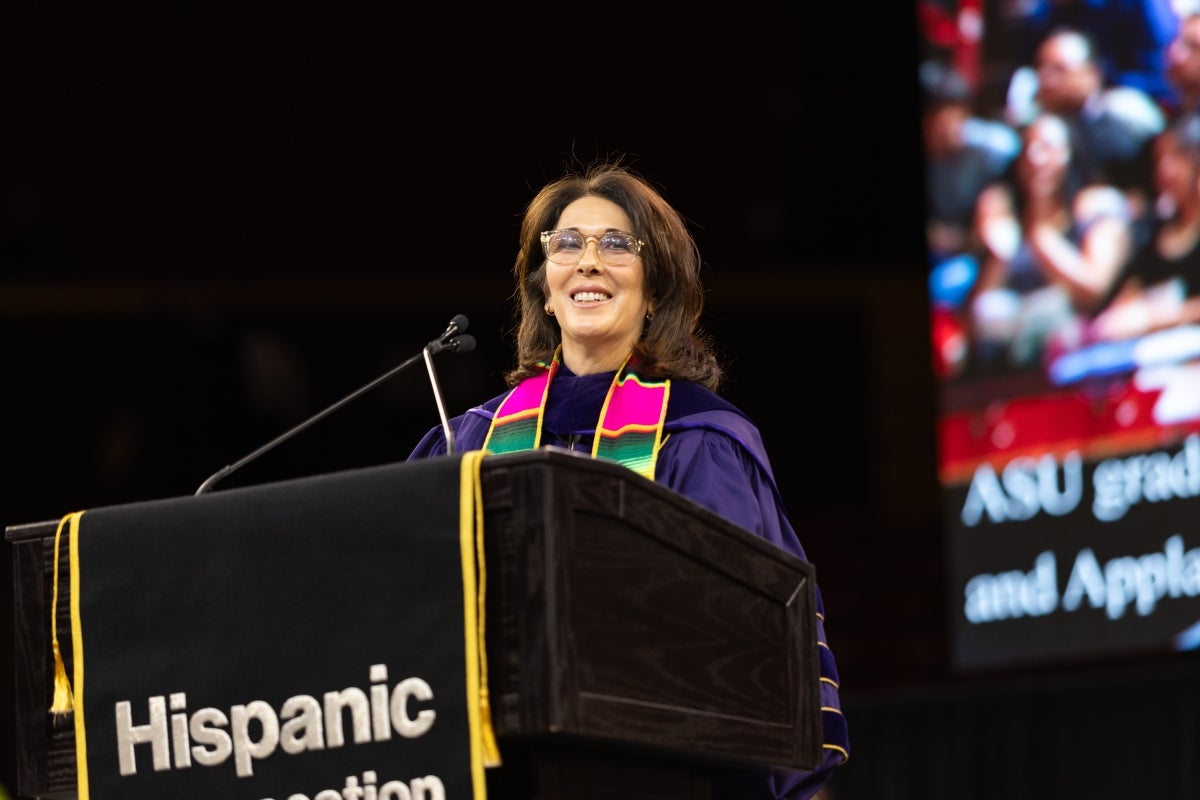ASU’s Hispanic Convocation celebrates 40th anniversary with music, dance and degrees

ASU's Hispanic Convocation is the largest multicultural event at the university. Approximately 9,100 people attended the May 4 event at Tempe's Desert Financial Arena, which saw 950 Hispanic and Latino students receive their certificates. Photo by Armand Saavedra
Alfredo Gutierrez is a man of many accomplishments.
He served 14 years in the Arizona Senate, including as minority and majority leader. Was the former president of the board for Maricopa Community College District. Has been a longtime advocate for civil rights and education. And has written books, was a radio show host and co-founded a public relations and policy firm.
And, now, he has a new feather in his cap — a college degree.
“This is a little embarrassing, a 78-year-old man finally getting his degree,” said Gutierrez, who received his Bachelor of Arts in liberal studies decades after he first attended Arizona State University. “It only took me 60 years!”
Gutierrez was not only the keynote speaker at ASU’s Hispanic Convocation on Saturday, May 4, at Desert Financial Arena in Tempe, but he was one of approximately 950 Hispanic and Latino students who attended the annual ceremony to collect their certificate.
Gutierrez spent the rest of his bilingual address encouraging graduates to improve their lives as well as the lives of others.
“The intellectual power in this room is us. There is before me this miracle of brilliance, talent, persistence and perseverance of joy,” Gutierrez said in front of approximately 9,100 people in attendance. “You will leave here today with the opportunity to make all of those dreams you’ve had come true — to teach, to seek new challenges, to be of service and to reach out to the furthest reaches of the universe.”
Gutierrez also encouraged Sun Devils not to forget the people who came before them or the ones who will follow.
“There will be generations of youngsters, Latinos, who will follow you,” Gutierrez said. “Many of them (may) fail. All of them need your help. Reach out to them. Do what you can. Tutor, teach, mentor, get your law degree. Fight for equality, justice and fight for better schools. Do not give up on your people. Do not give up on our children. Remember this — those who came before you did not give up on you.”
Hispanic Convocation is the largest multicultural event at the university, and it honors the accomplishments and commitment of ASU’s Hispanic students pursuing higher education, said Marissa Tuchalski, events manager in the Office of University Ceremonies.
“Our Hispanic and Latino graduates often inspire the next group of up-and-coming students,” said Tuchalski, who spends months preparing for the big day. “So, when a little brother or cousin gets to see their sibling or relative walking across the stage, they say to themselves, ‘Hey, I’m gonna do that one day, too.’ They keep inspiring the next generation.”
That appeared to be the theme of this year’s convocation, which is celebrating its 40th anniversary. The lively celebration included mariachis, ballet folklórico dancers, members of the original Hispanic Convocation committee who marched in this year’s procession, and the distribution of sarape stoles to graduates — a unique trademark of the ceremony.
The first Hispanic Convocation was held on May 12, 1984, and 49 people registered to attend. It was held off campus at El Tianguis, a mercado in the town of Guadalupe. This grassroots effort was led by student advocates Greg Acedo and David Lopez.
“Wow, here we are at the 40th anniversary of the ASU Hispanic Convocation. Who would have believed that a group of college students in their late teens and early twenties could make a difference? We did!” said Irene Martinez Diaz, who received her Bachelor of Arts in Spanish in 1984 and works today as an administrator for the Phoenix Union High School District. “I’m so proud of the legacy our founding committee has lovingly handed down to our community. I can’t wait to be part of the 50th anniversary. Si se puede!”
Video by AE Communications and Brand Team
Rosemary Ybarra-Hernandez was also there at the beginning, and remembers the celebration like it was yesterday.
“It was such a beautiful experience because both my parents, my sister, my brother and grandmother were there, so it was awesome,” said Ybarra-Hernandez, who received her bachelor’s degree in political science and earned a certificate in women’s studies in 1984. She went on to receive a master’s degree and doctorate in public administration, and serves on several boards today.
“A bit later in the ceremony someone said to me, ‘Hey, they just announced you as the Outstanding Undergraduate.’ And I was shocked.”
Ybarra-Hernandez has been paying it forward ever since. As CEO and founder of the Phoenix-based AGUILA Youth Leadership Institute, she prepares middle school and high school students for college and success in the professional world, many who end up attending ASU.
“We are proud to have Sun Devils graduate every year,” Ybarra-Hernandez said. “In fact, one of our students who was the 2017 Outstanding Graduate, Salvador Macias, was the first Arizona DACAmented attorney, and he will be seated next to me to witness the graduation of his younger sister."
By 2007, the convocation had introduced the Congressman Ed Pastor Outstanding Graduate Student award and, in 2015, the Cecilia D. Esquer Outstanding Undergraduate award to recognize the extraordinary achievements of two ASU graduates. Pastor and Esquer were considered trailblazers for ASU Hispanic faculty, staff and students, and instrumental in their support of Hispanic Convocation.
ASU enrolled just over 144,000 students across its four campuses at the beginning of the fall 2023 semester. Of that total, approximately 40,000 were Hispanic undergraduates and graduate students. Their academic achievements are supported by more than 2,600 Hispanic faculty and staff, according to the Office of Inclusive Excellence.
Those numbers are something to be proud of said Nancy Gonzales, ASU executive vice president and university provost.
“Look how far we’ve come today,” said Gonzales, ASU’s first Hispanic provost. “We are graduating over 4,200 Hispanic and Latino students, and we need a major arena to accommodate us. It won’t be much time at all until we’re going to move this celebration to the stadium.”
Gonzales added that ASU is proud to be a Hispanic-Serving Institution, which is a federal designation by the Department of Education reserved for universities where at least 25% of the undergraduate population is Hispanic. She said ASU was also named the 2023 Education Partner of the Year by the Hispanic Scholarship Fund and is one of a few universities who are a two-time recipient of the Seal of Excellencia from Excellencia in Education for service to Hispanic and Latino students and scholars.
“The legacy of our Hispanic graduates proves that not only do we belong in higher education, but we thrive and we make a real impact in the world and in our communities,” Gonzales said.
Graduates Aiselyn Anaya-Hall and Emmeline Luz Wuest made it a point to shake hands and take a selfie with Gutierrez after the ceremony. They said they’ve taken his words to heart.
“It’s really inspiring knowing that those who came before us pushed so hard so that we could succeed today,” said Anaya-Hall, who received her bachelor’s degree in political science, a minor in justice studies and a European studies certificate. “That goes to our parents, our grandparents and relatives who have immigrated from many countries. It inspired me to keep going because I know that I wasn’t the first and I’ll make sure I won’t be the last.”
Weust, a double major in English (creative writing) and anthropology, said she hopes one day to become a policy advisor in the public sector.
“Listening to the former state senator made me reflect back on my heritage,” Weust said. “My great-grandmother used to clean hotel rooms. Getting this degree makes me happy, but it makes me also realize and reflect on those who struggled and have passed on. I’m going to have a better life because of the sacrifices made on my behalf.”
Related stories
- Advice to spring 2024 grads: 'Spend your time creating new things'
- Starbucks, Uber commemorate milestone for ASU grads
- Largest graduating class in ASU history sets out to make a difference
- The College of Liberal Arts and Sciences recognizes Dean’s Medalists
- College of Integrative Sciences and Arts honors first-ever Dean’s Medalists
More Sun Devil community

A champion's gift: Donation from former Sun Devil helps renovate softball stadium
Jackie Vasquez-Lapan can hear the words today as clearly as she did 17 years ago.In 2008, Vasquez-Lapan was an outfielder on Arizona State University’s national championship-winning softball team,…

Student-led business organization celebrates community, Indigenous heritage
ASU has seen significant growth in Native American student enrollment in recent years. And yet, Native American students make up less than 2% of the student population.A member of the Navajo Nation,…

Remembering ASU physical chemist Andrew Chizmeshya
Andrew Chizmeshya, a computational chemist and materials scientist whose work spanned over three decades at Arizona State University, died on March 7 at the age of 63.A dedicated mentor and cherished…


